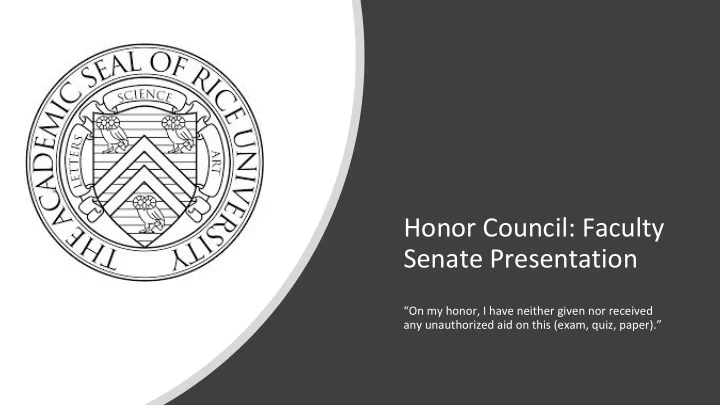

Honor Council: Faculty Senate Presentation “On my honor, I have neither given nor received any unauthorized aid on this (exam, quiz, paper).”
The Honor Council • Elected group of students who review cases of Honor Code violations and vote on decisions • Entirely student-run • Works to maintain trust and respect between student and faculty • Holds open meetings every year to discuss possible changes to the consensus penalty structure (CPS) and new initiatives
What is the current Honor Council process? • Process begins with an accusation (usually from a professor or TA) • Investigative Meeting • Accused is presented with evidence • Council decides if there is enough evidence to proceed with the case • Possible results: drop the case or move on to a hearing • Hearing • Council meets with the accused student and reviews the evidence • Possible results: not in violation or in violation (and appropriate penalty) • Investigative Meeting → Hearing → In Violation / Not In Violation
Alternative Resolution (AR) • Offers an abbreviated procedure and reduced penalty to students who plead “In Violation” and take responsibility for their mistakes • Investigative Meeting → Hearing → In Violation / Not In Violation (Alternative Resolution Offered) In Violation (Reduced Alternative Resolution Penalty)
Alternative Resolution (AR) • Eligibility Criteria: • Student has no prior Honor Code violations • The Investigative Meeting panel does not find any aggravating factors • Student waives rights to a hearing and appeals • If offered the Alternative Resolution, students have 48 hours after the Investigative Meeting to decline or accept • If the student declines the AR or does not respond within 48 hours, the case will proceed to a Hearing
Consensus Penalty Structure (CPS) • Documentation the Honor Council uses to decide what the starting penalty is if the student is found “In Violation” • The Honor Council can mitigate or aggravate from the starting penalty if mitigating/aggravating factors are found • CPS meeting held every year to decide if any changes need to be made (anyone is invited to come) • Changes need to be approved by a 3/4 vote of the council
Old Consensus Penalty Structure (CPS) Penalty Starting Condition F in the course and 3 semester suspension -- F in the course and 2 semester suspension 45%+ of the course grade F in the course and 1 semester suspension 33-45% of the course grade F in the course 20-33% of the course grade 3 letter grade reduction 12-20% of the course grade 2 letter grade reduction 6-12% of the course grade 1 letter grade reduction Under 6% of the course grade Letter of Reprimand --
Alternative Resolution & Corresponding CPS • In effect for all cases received AFTER March 3rd, 2019
Annual CPS Meeting • Saturday October 26th from 12PM - 2PM in the Duncan PDR • All students and faculty are invited and welcome to participate in the discussion regarding potential changes to the CPS • Food will be provided
New Time Limitation Statute on Accusations • The Council (in consultation with SJP) will reserve the right to declare that cases cannot be heard due to significant delay if: • 90 or more days passed between date of suspected violation and date of accusation (submission to the Council) • 60 or more days passed between date of accusation and submission of evidence by anyone who is not the accused student • Significant delay in reporting suspected misconduct may reduce the availability of evidence crucial for the Honor Council to reach a fair decision
New Faculty Advisor • Dr. James DeNicco • Director of Principles of Economics Program and Lecturer • Available to answer questions about the Honor System and provide input from a faculty’s perspective • Email: james.denicco@rice.edu
Questions? • More detailed information about all procedures can be found online at honor.rice.edu • Email honor@rice.edu at any time if you have any questions
Recommend
More recommend